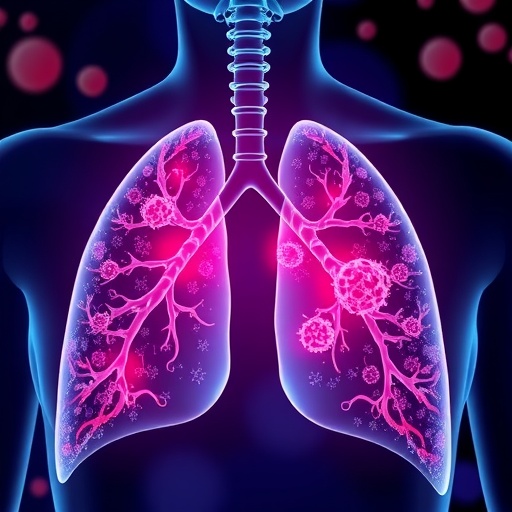In a groundbreaking development for the treatment of small cell lung cancer (SCLC), researchers have identified a novel therapeutic strategy that significantly boosts the efficacy of existing chemo-immunotherapy protocols. Spearheaded by the Hospital del Mar Research Institute in collaboration with the CIBERONC cancer research network, this multicenter study highlights the pivotal role of the MET signaling pathway in mediating resistance and poor prognosis in SCLC, while revealing how its targeted inhibition enhances outcomes in preclinical models. Published in Cell Reports Medicine, this research uncovers a promising avenue for overcoming the notorious aggressiveness and treatment refractoriness characteristic of SCLC.
Small cell lung cancer, although comprising only about 15% of all lung cancer cases, presents one of the most formidable challenges within oncology due to its rapid growth kinetics, early dissemination, and exceptional capacity for therapeutic resistance. Patients commonly face dismal prognoses, with three-year survival rates lingering near 15%, largely attributable to late-stage diagnosis and absent curative surgical options. Current standard-of-care combines chemotherapy with immunotherapy agents targeting immune checkpoints such as PD-L1, yet the transient nature of response and the eventual emergence of resistance demand innovative adjunctive interventions.
Central to this study is the investigation of the MET gene and its ligand, hepatocyte growth factor (HGF). This receptor tyrosine kinase axis is implicated in driving cellular proliferation, survival, and migration—biological processes instrumental to tumor progression and metastasis. Notably, aberrant activation or overexpression of MET confers a hostile tumor microenvironment that impairs immune cell infiltration and reduces sensitivity to therapy. The team hypothesized that pharmacological inhibition of the MET pathway could remodel the tumor milieu and potentiate immunotherapeutic efficacy in SCLC.
Using meticulously designed murine models that faithfully recapitulate human SCLC, the researchers evaluated several therapeutic regimens: untreated controls, chemotherapy alone, combination chemotherapy with anti-PD-L1 immunotherapy, and the triad of chemotherapy, immunotherapy, plus a MET inhibitor. Remarkably, the inclusion of the MET inhibitor yielded superior antitumor activity, evidenced by decelerated tumor progression and enhanced survival metrics. Impressively, two-thirds of the tumors in this group achieved complete remission, underscoring the profound impact of MET pathway blockade when integrated into standard treatment pipelines.
According to Dr. Edurne Arriola, the study’s lead investigator and an expert in lung cancer molecular therapeutics at Hospital del Mar, the MET inhibitor does not exert a direct cytotoxic effect on tumor cells per se. Instead, it orchestrates favorable alterations within the tumor microenvironment, thereby alleviating immunosuppressive barriers. This immunomodulation effectively amplifies the capacity of T cells, activated by anti-PD-L1 immunotherapy, to recognize and eradicate malignant cells. The resulting synergistic interplay translates into more durable and robust therapeutic responses.
The mechanistic insights unveiled by this research offer a compelling narrative for how MET influences tumor-immune dynamics. HGF-MET signaling fosters a microenvironment rich in immunosuppressive factors and structural elements that hinder immune cell infiltration. By disrupting this axis, the MET inhibitor reconditions the microenvironment, facilitating the infiltration and activation of effector T cells critical for antitumor immunity. This represents a paradigm shift in understanding treatment resistance—not only as a tumor-intrinsic phenomenon but as a complex interaction with immune components and stromal factors.
Further validation came from the analysis of human tumor biopsies, illustrating that approximately 50% of SCLC patients exhibit MET overexpression. These patients correspondingly demonstrate worse clinical outcomes and diminished responsiveness to current chemo-immunotherapy standards. The parallel between preclinical findings and patient-derived samples strengthens the translational potential of MET inhibitors, suggesting that their incorporation into clinical practice could address a substantial unmet need in this high-risk population.
While the study stops short of clinical application, it lays the essential groundwork for an imminent clinical trial designed to test the efficacy of integrating MET inhibitors during maintenance immunotherapy phases. The trial plans to assess whether sustained suppression of MET signaling post-induction therapy can forestall tumor progression and improve survival outcomes for SCLC patients. This clinical exploration promises to validate the preclinical promise of MET pathway modulation and potentially revolutionize therapeutic strategies.
SCLC’s notorious resistance to therapy underscores the importance of multipronged approaches that target not only the cancer cells but also the tumor-supportive environment. By advancing a model wherein targeted MET inhibition complements and enhances immune checkpoint blockade and cytotoxic chemotherapy, this study charts a new course in overcoming the formidable barriers in lung cancer treatment. The findings herald a progression toward personalized, mechanism-driven care paradigms that tailor interventions based on tumor molecular profiles.
The implications of these results extend beyond SCLC, as the MET-HGF axis is implicated in diverse malignancies characterized by treatment resistance and aggressive clinical behavior. Thus, effective MET inhibition strategies may find broader applications, offering hope for patients with other refractory cancers. Moreover, this work exemplifies the power of combining targeted molecular inhibitors with immunotherapy to unlock synergistic effects that transcend monotherapy limitations.
In sum, this landmark investigation not only elucidates a critical pathway underpinning SCLC pathogenesis and therapeutic escape but also presents a viable, clinically actionable strategy to enhance the effectiveness of current treatments. It embodies over a decade of dedicated research and stands poised to transform the standard of care for a cancer type that has long eluded meaningful advances, bringing hope to patients and clinicians alike.
Subject of Research: Small cell lung cancer (SCLC), MET gene inhibition, chemo-immunotherapy enhancement
Article Title: MET pathway inhibition increases chemo-immunotherapy efficacy in small cell lung cancer
News Publication Date: 20-Jun-2025
Web References: https://doi.org/10.1016/j.xcrm.2025.102194
Keywords: Small cell lung cancer, MET gene, hepatocyte growth factor, immunotherapy, chemotherapy, tumor microenvironment, resistance mechanisms, receptor tyrosine kinase, PD-L1, targeted therapy, tumor immunology, cancer molecular therapeutics




